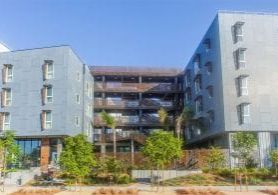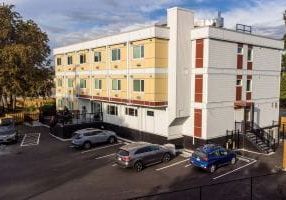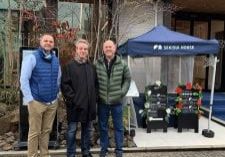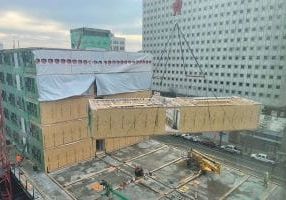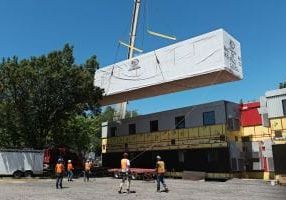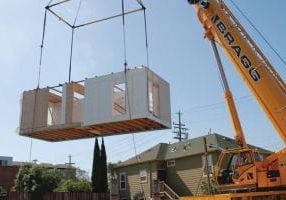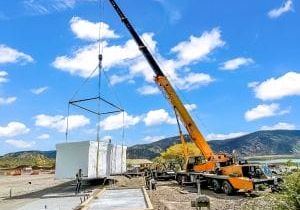Blazer Industries - Pediatric Dental Clinic
The Springfield Kids Dentist Clinic was designed with kids in mind. Unlike many pediatric dental clinics, this building is pleasing and fun to the kids’ eyes while not distracting them with costly technology used to ease a child’s anxiety with the visit. The goal of the client was to provide top notch affordable care while minimizing additional overhead costs. 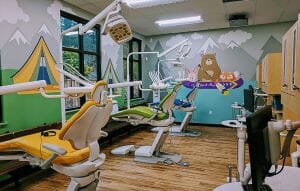
The flow of the clinic obtained by the design, and the work of the interior designer, creates a highly functional clinic without the high cost of unnecessary added features. The simplicity of the design allowed for a smooth and efficient set up on site without compromising the clients vision.
This project was built with a contractor who fully understands how modular works. This allowed for seamless timing between the completion of production in the factory, and the need for the project on site.
We also worked closely with the contractor to delineate the scope of work to maximize the speed, efficiency, and cost savings of modular, while maintaining the flexibility needed to suit the client. The use of modular construction allowed for a reduced project schedule, early occupancy, and quicker return on investment.
This article originally appeared in the Modular Advantage Magazine - First Quarter 2018 released in February 2018.
More from Modular Advantage
Inside the Construction of 355 Sango Court
This year’s winner for Best of Show for Permanent Structures is 355 Sango Court, a 105,818 square foot affordable housing development manufactured by Nampa, Idaho based Autovol. The project team also included Prefab Logic for module design, Nibbi Brothers as the general contractor, Acc U Set Construction as the modular installer, and the overall project design was by David Baker Architects and DCI and Fard.
Aster Place by ROC Modular
Aster Place, a supportive housing building in Richmond, British Columbia, Canada, won the Best of Show Award and Honorable Mention for relocatable structures in the social and supportive housing category at this year’s World of Modular conference.
Looking Back at the 2024 World of Modular
On March 18-21, the Modular Building Institute presented its 41st annual
convention and tradeshow, hosted again at the luxurious the Rosen Shingle Creek in Orlando, FL. Nearly 1,500 attendees from around the world gathered to learn, network, and find ways to expand both their businesses and the industry at-large.
Touring Japan’s Offsite Construction Industry: An Interview with James Haas, Offsite Construction Sales Manager for Nichiha
Nichiha USA, a premier provider of building envelope solutions and member of the Modular Building Institute (MBI), recently partnered with MBI for a trip to Japan to visit the Nichiha home office in Nagoya as well as several other offsite manufacturers around the country. Besides learning about different offsite building methodologies and systems, the trip was an excellent chance for both MBI and Nichiha to create closer ties with potential industry partners in Japan.
Modular Multi-family Construction: A Field Study of Energy Code Compliance and Performance through Offsite Prefabrication
Prefabrication in a factory setting may improve the performance of modular buildings compared to traditional site-built buildings. To validate this premise, the U.S. Department of Energy (DOE) funded a 3-year study from 2020-2023 comparing the energy performance of more than 50 modular and site-built multifamily buildings under construction in Los Angeles, San Francisco, Philadelphia and Seattle.
Inflation Comes in Hot to Begin ’24
Last year was a shockingly good one for the U.S. economy, at least relative to expectations. Coming into 2023, the conventional wisdom was that near-term recession was inevitable in America. In the face of belligerent excess inflation (above the Federal Reserve’s 2 percent mandate), monetary policymakers began ratcheting interest rates higher in March 2022. That process continued throughout the balance of the year and into 2023.
A Huge Win for the Modular Construction Industry in Massachusetts
In early February, 2024, the Massachusetts Board of Building Regulations and Standards (BBRS) released its proposed 10th Edition building codes. This draft included several amendments targeting modular construction that would have created an extremely difficult environment for the entire modular industry and could have eliminated the industry entirely in the state.
FEMA Announces Hawaii Housing Plan Using Modular Construction
Utah becomes the second state in the country, following Virginia, to fully adopt ICC/MBI standards 1200 and 1205. MBI will continue to work with leadership in Utah to implement the new program.
Supply and Demand: Solving Canada’s Housing Crisis One Relocatable Housing Unit at a Time
Not only do Moda Modular’s repurposed employee housing solutions cut the emissions related to construction down to nearly zero, but they also keep building materials that are often not biodegradable from slowly decaying in storage facilities.
It’s the classic environmental mantra of reduce, reuse, and recycle, scaled up and applied to building after building.
ICC/MBI Standards 1200 & 1205 Provide Foundation for Utah’s First-Ever State Modular Program
Utah becomes the second state in the country, following Virginia, to fully adopt ICC/MBI standards 1200 and 1205. MBI will continue to work with leadership in Utah to implement the new program.

